Politics not a fast bowling game
Talks & Terror cannot go together
Hari Jaisingh
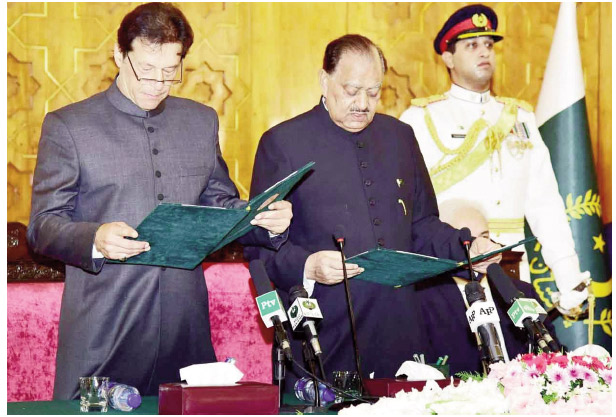 Imran Khan's oath taking ceremony at the President House
The world of cricket is
an entirely different
ball game, whether it is
a five-day Test or a T-
20 or 50-over dazzling
show. In contrast,
political games, whether under a
military regime or as part of a
half-baked guided democracy
under military diktats, are
conducted differently as often
seen in Pakistan. In any case, the
first-time success of Imran Khan
and his party Pakistan Tehreek-e-
Insaf (PTI) in the July 2018 general
elections must be hailed
gracefully.
Imran Khan's oath taking ceremony at the President House
The world of cricket is
an entirely different
ball game, whether it is
a five-day Test or a T-
20 or 50-over dazzling
show. In contrast,
political games, whether under a
military regime or as part of a
half-baked guided democracy
under military diktats, are
conducted differently as often
seen in Pakistan. In any case, the
first-time success of Imran Khan
and his party Pakistan Tehreek-e-
Insaf (PTI) in the July 2018 general
elections must be hailed
gracefully.
This has been attributed to the
military back-up for the former
cricket icon, to the disadvantage
of other leaders. I am not going
into the rights and wrongs of the
Pakistan poll process. This has
become a controversial matter
globally. Even the US has
expressed reservations. However,
this is Pakistan’s internal matter.
So, it needs to be left to the
people there.
However, the main question for
us is not one of the decisive role
played by the all-powerful
Generals in running critical policy
and strategic affairs of their
country. This has been a harsh
ground reality for decades,
especially with regard to India and Afghanistan and related
matters. An added factor in
Pakistan’s socio-political
operations for more than a
decade has been the emergence
of radical Islamist groups there,
from the Taliban to JeM and LeT,
with clear ISI and army support.
The “proxy war” of terrorism was,
of course, the brain-child of
General Zia-ul-Haq to grab
Kashmir by hook or by crook.
These Pak-sponsored terror
games have acquired sinister
dimensions to spread fear and
hatred in the name of Islam the
world over. These terror games
were first started in a big way
under the patronage of Osama
Bin Laden, a rich fugitive from
Saudi Arabia.
Ironically, resort to
terrorism by misusing
religion has boomeranged on
Pakistan. No wonder,
Islamabad today stands at the crossroads of its future.
Pakistan’s new firebrand
politician, Imran
Khan, is known to have
enjoyed full support
from Islamabad’s
military establishment.
What is worrying for
New Delhi is the support
Imran is said to have
received from various
terrorist groups. These
terrorist groups have
thrived with the back-up
of the ISI and the
Pakistan army to upset
India’s strategic interests
in the Kashmir Valley
and beyond.
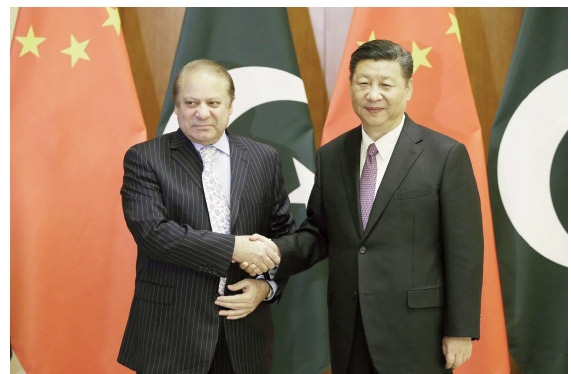 President Xi Jinping has formalised the Beijing-Islamabad axis
Pakistan’s new fire-brand
politician, Imran Khan, is known
to have enjoyed full support from
Islamabad’s military
establishment. What is worrying
for New Delhi is the support
Imran is said to have received
from various terrorist groups. We
all know that these terrorist
groups have thrived with the
back-up of the ISI and the
Pakistan army to upset India’s
strategic interests in the Kashmir
Valley and beyond. Chinese
President Xi Jinping has now
formalised the Beijing-Islamabad
axis. This, too, raises quite a few
critical issues for New Delhi.
President Xi Jinping has formalised the Beijing-Islamabad axis
Pakistan’s new fire-brand
politician, Imran Khan, is known
to have enjoyed full support from
Islamabad’s military
establishment. What is worrying
for New Delhi is the support
Imran is said to have received
from various terrorist groups. We
all know that these terrorist
groups have thrived with the
back-up of the ISI and the
Pakistan army to upset India’s
strategic interests in the Kashmir
Valley and beyond. Chinese
President Xi Jinping has now
formalised the Beijing-Islamabad
axis. This, too, raises quite a few
critical issues for New Delhi.
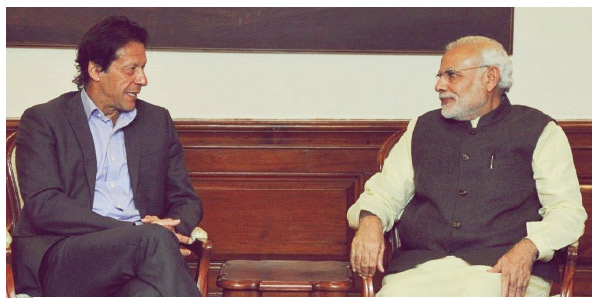 Will they be able to set the pace for better Indo-Pak ties ?
The moot point is: will Imran
Khan as Prime Minister be a mere
puppet in the hands of the
military establishment? Second,
will terrorist groups operate
freely across the Valley as they
have been doing for decades? If
so, then what to make of India’s
MEA spokesperson Ravesh
Kumar’s hope that “the new
government of Pakistan will work
constructively to build a safe,
stable, secure and developed
South Asia free of terror and
violence?”
Will they be able to set the pace for better Indo-Pak ties ?
The moot point is: will Imran
Khan as Prime Minister be a mere
puppet in the hands of the
military establishment? Second,
will terrorist groups operate
freely across the Valley as they
have been doing for decades? If
so, then what to make of India’s
MEA spokesperson Ravesh
Kumar’s hope that “the new
government of Pakistan will work
constructively to build a safe,
stable, secure and developed
South Asia free of terror and
violence?”
Well, I share the sentiments
and hope of Ravesh Kumar for
better ties with Islamabad. Still, I
prefer to keep my fingers crossed
till Imran Khan begins playing a
positive role for peace and
development in the subcontinent,
as Indian Prime Minister
Narendra Modi has said in his
greetings message to the Pakistan
Prime Minister-elect who won a
plurality of the vote for the high
position.
True, Imran is known to have a
sharp focus and determination. If
he picks up the right lessons from
the history of the subcontinent’s
turmoil and gets set to “walk the
extra mile for peace” with India,
then his swinging balls and sixers
could set the pace for new India-
Pakistan relations. A lot will
depend on Pakistan’s approach
and attitudes on resolving the
Kashmir issue.
I have no instant answer
to the long prevalent
anti-India hysteria of
various Pakistan leaders.
From my personal
experience, the only
exception to this anti-
India pattern was Nawaz
Sharif who has virtually
been sidelined and
marginalised by the
military establishment.
Interestingly, Imran Khan on
August 22 expressed his desire
to initiate talks with India and
start trading talks in order to
resolve conflicts, including
Kashmir, eradicate poverty and
provide a better quality life to
the people of the two
neighbouring countries.
Fine. There should be no
problem in resuming a
meaningful India-Pakistan
Dialogue. But, the military ISIsponsored
terrorists’ bullets in
the Valley and bilateral talks
cannot go together. Has Imran
Indian leaders, experts
and diplomats have to be
cool and calculating,
having proper
assessment of
happenings in Pakistan.
Everything emanating
from Islamabad has to
be taken with a pinch of
salt. If we accept this
proposition, it will,
probably, be easier for
South Block to work out
right responses to
Islamabad’s armysponsored
moves that
have caused problems to
India for decades.
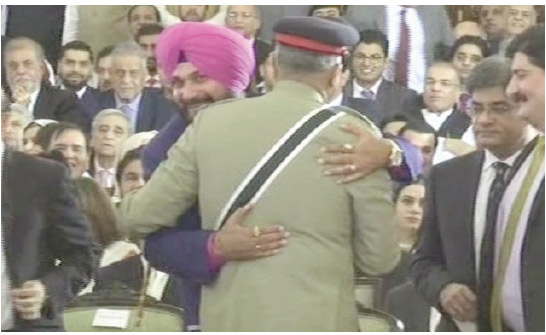 Navjot Singh Sidhu hugs Pak Army Chief General Qamar Javed Bajwa
Khan taken clearance from his
Generals before spelling out
publicly his peace “intentions” for
talks with New Delhi. India does
not want to be, once again, caught
in the crossfire of bilateral talks
and bullets from the across the
borders and the “proxy war” of
terrorism in Jammu and Kashmir.
Navjot Singh Sidhu hugs Pak Army Chief General Qamar Javed Bajwa
Khan taken clearance from his
Generals before spelling out
publicly his peace “intentions” for
talks with New Delhi. India does
not want to be, once again, caught
in the crossfire of bilateral talks
and bullets from the across the
borders and the “proxy war” of
terrorism in Jammu and Kashmir.
The question here is not
“unofficial hugging” of “cricketer “
Navjot Singh Sidhu with Pakistan
General Qamar Javed Bajwa.
This “hugging business” has
been going on at various levels
globally all the time. But this
does not help solve differences
and problems, if the mindset
at the other side remains
opaque… This has been India’s experience for decades.
Fathoming the Pakistan mind
has generally been a major
headache for Indian politicians,
experts and diplomats. Very few
leaders here could see Pakistan in
true colours. The question is not
who is a hawk or who is a dove,
but of getting facts straight and
evolving a right approach and
responses. The real question
before South Block is: “What lies
behind Imran Khan’s mind?”
I have no instant answer to this
question against the backdrop of anti-India hysteria of various
Pakistan leaders. From my
personal experience, the only
exception to this anti-India
pattern was Nawaz Sharif who has
virtually been sidelined and
marginalised by the military
establishment. One of his crimes,
it is believed, has been his
independent stance adopted
without taking into confidence the
all-powerful army Generals for
building bridges of understanding
with India mainly for promoting
bilateral trade.
In the circumstances, what is
needed is a clear perception of
Imran Khan’s government sworn
in on August 18.
Indian leaders, experts and diplomats have to be cool and
calculating, having proper
assessment of happenings in
Pakistan. Everything emanating
from Islamabad has to be taken
with a pinch of salt. If we accept
this proposition, it will, probably,
be easier for South Block to work
out right responses to
Islamabad’s army-sponsored
moves that have caused problems
to India for decades.
It needs to be stated that
understanding the mindset of
those at the helm of affairs in Islamabad will not be easy. They
invariably play games, both with
the gun and without it.
So, the changing ground realities
in Pakistan have to be constantly
kept in mind. Equally crucial is the
firming up of varied options to
meet various situations at different
times.
Looking at the nature of
complications and the neverending
Pakistan propaganda, New
Delhi has no choice but to keep its
diplomats on their toes so that they
do their homework properly and
keep world leaders well-informed
about what is what and who is what
on the other side of the border.
There is no need to be
apologetic about what our country
stands for.
It has only to vigorously pursue
its national interests and objectives
with determination. In fact, there has to be a sense of pride in India’s
democratic values of liberalism and
secularism the country stands for.
Prime Minister Narendra Modi’s
government and the Sangh
Parivar have to correct certain
aberrations in their functioning. I
am sorry to say that the ruling class
today does not understand the
problem of India’s “imagebuilding”
which has to be part of
the country’s democratic spirit;
tolerance, liberalism and
secularism.
Also, what is disquieting is that
New Delhi and Srinagar continue to
be oscillating between confusion
and uncertainty to the advantage
of Islamabad.
India will have to find its own
answers to break Pakistan’s orbit as
well as nexus with the spectre of
terrorism. It is a pity that the ISI
and extremist Islamic groups
PM House in Islamabad
continue to help the Al-Qaeda and
diehard Taliban fighters with two
objectives: First, to use them in
Kashmir and upset India’s strategic
interests and secular credentials
there.
Second, to keep the Pashtuns
divided as Pakistan views Kabul as
a client state against New Delhi. We
have to wait and watch how Imran
Khan conducts himself in the
crucial months ahead. I personally
wish him all the success for
building Pakistan
as a welfare state for the
betterment of people. India can be
a big asset for Imran’s onerous
tasks ahead. Let us see how he
emerges as a politician with
a difference!
Good luck to Imran Khan’s
Pakistan, where most leaders still
retain in a feudal mindset !
Imran keeps his word
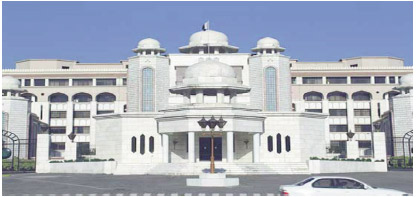 PM House in Islamabad
I must take this opportunity to bring into
focus one part of Imran Khan’s victory speech
which is equally relevant to Indian leaders as
well. Imran Khan said :
PM House in Islamabad
I must take this opportunity to bring into
focus one part of Imran Khan’s victory speech
which is equally relevant to Indian leaders as
well. Imran Khan said :
“I will live humbly” ….., “end the VIP
culture….” and make a ‘Naya Pakistan !”
“Our government will decide what we
will do with PM House. I would be
ashamed to live in such a lavish house.
The house will be converted into an
educational institution or something of
the sort for the welfare of the people…
“So far we have seen that everyone
who comes to power changes. That will
not happen with me. I decided to join
politics 22 years back when I saw
collapse of governance system and
corruption in Pakistan. I wanted
Pakistan to become the country that my
leader Quaid-i-Azam Muhammad Ali
Jinnah had dreamed of.”
It is heartening to note Imran Khan has
already shifted to a moderate house, earlier
allotted to PM’s military secretary. I hope Imran
would now be true to all his words. That will be
quite a lesson for all developing countries,
including India. For the present, I do not wish to
mix up matters. Perhaps, I shall discuss one day
separately the kind of lavish living style our
leaders indulge in under the pretext of security
etc. In a vibrant democracy like ours, the people
living below the poverty line and in inhuman
conditions ought to be a top priority and
challenge to our leaders.




 Imran Khan's oath taking ceremony at the President House
Imran Khan's oath taking ceremony at the President House President Xi Jinping has formalised the Beijing-Islamabad axis
President Xi Jinping has formalised the Beijing-Islamabad axis Will they be able to set the pace for better Indo-Pak ties ?
Will they be able to set the pace for better Indo-Pak ties ? Navjot Singh Sidhu hugs Pak Army Chief General Qamar Javed Bajwa
Navjot Singh Sidhu hugs Pak Army Chief General Qamar Javed Bajwa PM House in Islamabad
PM House in Islamabad